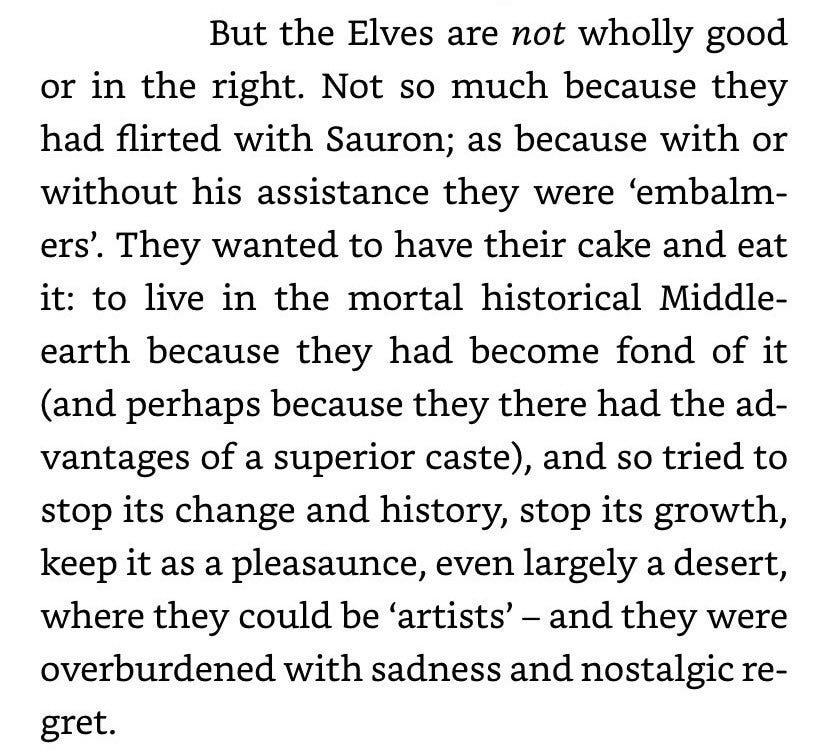The other day I came across this excerpt from one of J.R.R. Tolkien’s letters (yes, this is a Lord of the Rings-adjacent post). In the letter, Tolkien writes about some of the reviews of LOTR that suggest it is an oversimplified, good vs evil story. Anyone who has read the books knows that is itself an oversimplified view. In response, Tolkien draws attention to the elves. In the movies the elves can seem a bit above it all, a bit too good for the world. But Tolkien sees them differently:

The “flirting” Tolkien refers to includes the elves’ attempts to use Sauron’s power while assuming they could be free of his influence or corruption. That would be an easy example of the elves being less than perfect, but it isn’t the example Tolkien points to. In essence, he says that one of the chief failures of the elves was deciding that they liked the world as it was and resisting anything that might bring change.
As much as I would absolutely love to write an entire post about how the elves got to that place (it has to do with the “sadness and nostalgic regret” Tolkien mentions), I have no wish for Matter at Hand to hemorrhage subscribers.
I do, however, find Tolkien’s description of the elves as “embalmers” fascinating. He could have said they wanted to preserve or conserve the world they knew and loved. Instead, he chose a very different and very evocative word. If you’re like me, the word “embalm” makes you think of mummified pharaohs. “Preserving,” on the other hand, has a much more positive connotation.
Preserving keeps a thing’s vitality fresh. If you preserve food, you’re ensuring it’s good to eat for a longer period of time. So, one way of thinking about preservation is that it extends the amount of time something is life-giving. This is, for example, the difference between a museum that houses historical artifacts and, say, a historical society that seeks to preserve the legacy of a site or a person. That society believes there is a benefit to keeping that legacy “alive” as it were, so that it can impact current culture in meaningful ways.
The way Tolkien wrote the elves, though, was very different. They had no interest in being a life-giving presence to others in Middle Earth. They were almost entirely inwardly focused and resented the other races. They had vast knowledge and wisdom but had stopped sharing it, preferring to simply exist in their sylvan enclaves and brood.

Unlike preservation, embalming does not extend anything’s vitality because the thing is already dead. Embalming merely staves off decay. But if something is dead then decay is simply a matter of time.
I wonder how often we think we are engaged in preservation but are actually in the act of embalming. There are, to be sure, many things worth preserving and that should be preserved. When we preserve something that is alive, though, we have to allow that thing to grow and change in certain ways. Preserving a tradition or way of life for the next generation involves trusting them to take ownership of it.
It’s possible that each subsequent generation will fail to preserve what they have been handed. More often, though, what older generations see as a failure of preservation is actually the extension of life through necessary change. The elves didn’t want to experience any change whatsoever and when it comes to the things we care most about, neither do we.
So, fearful of what the next generation might do with our organizations or churches, we keep them to ourselves until they have lost their vitality. Free from interference, we mummify those things so that they will always be as we wish them to be. And then, of course, we feel confused and resentful when the young no longer want them.
What older generations see as a failure of preservation is actually the extension of life through necessary change.
I think it is very easy to fool ourselves into thinking we are preserving something that has already died. Or, in another way of thinking, sometimes we try to preserve something with tools that are meant to embalm. Thus, we try to preserve something by means that actually kill it. In either case, change is the enemy, and those who would bring change become enemies too.
This is not, to be sure, some sort of blanket endorsement of broad, far-reaching change in every facet of society. Far from it. But change is inevitable, and if we pretend otherwise we are simply ignoring reality. Proverbs 14:4 says, “Where there are no oxen, the manger is clean, but abundant crops come by the strength of the ox.” (ESV) An empty stable is much easier to maintain just the way you want; but that isn’t really what it is for.
Preservation is a good and important part of passing on things that matter to future generations. The goal, though, must be to give them a living thing that they can then shape as their times require. The alternative is to give them something dead that can never change. That might please us, but we will watch as the young throw it away in disgust.




A central question that your post raises is "what is the purpose of this?" If your view is that you've been entrusted with certain things - values, traditions, practices - by previous generations, and your responsibility is to transmit them successfully, then preserving makes sense. You also realize that you adapted what you received, and it makes sense that the next generation will do what you did. But if everything is centered on you and what you want, then it makes more sense to resist even needed change. In other words, I think a big part of the issue you raise comes down to selfishness.
Is it too simplistic to say “change is inevitable, so relax and enjoy it(if only)?